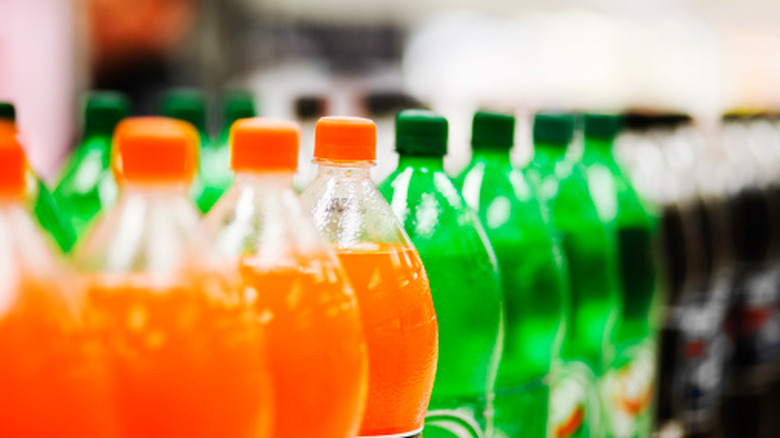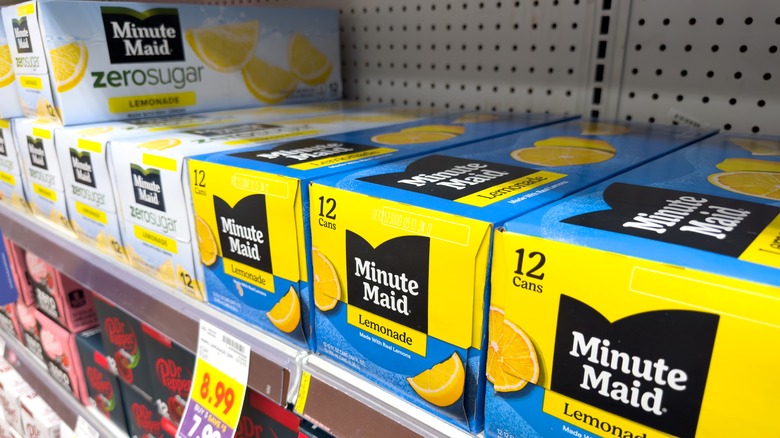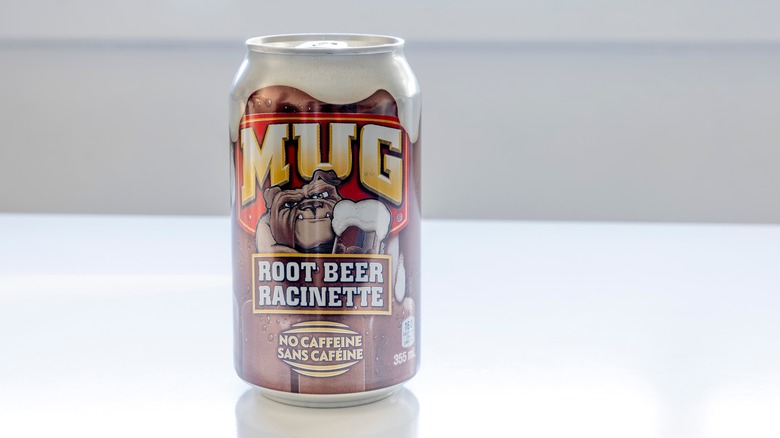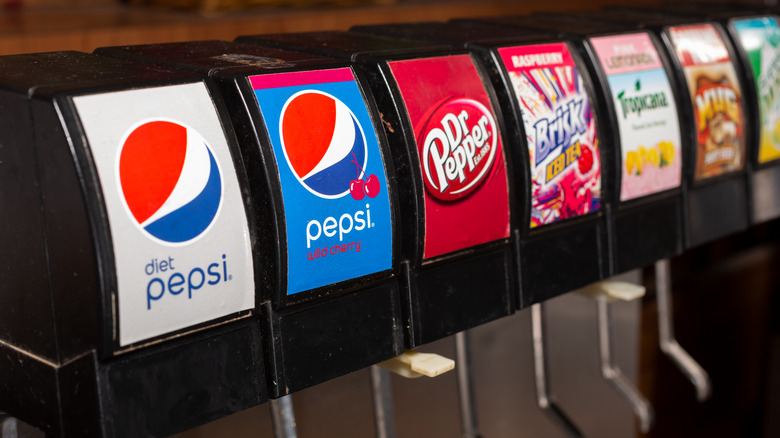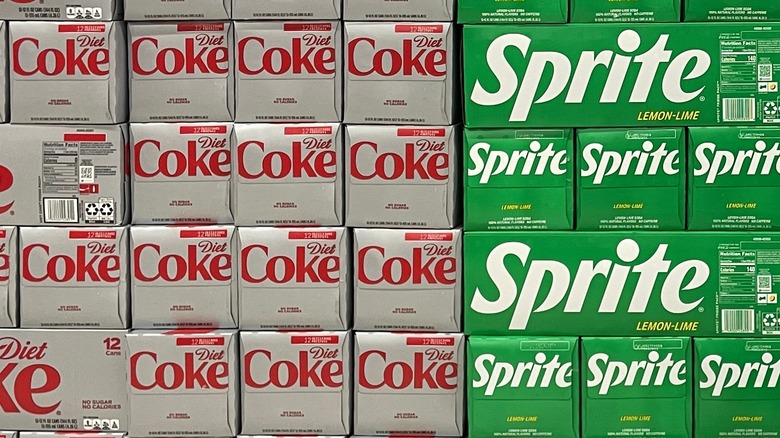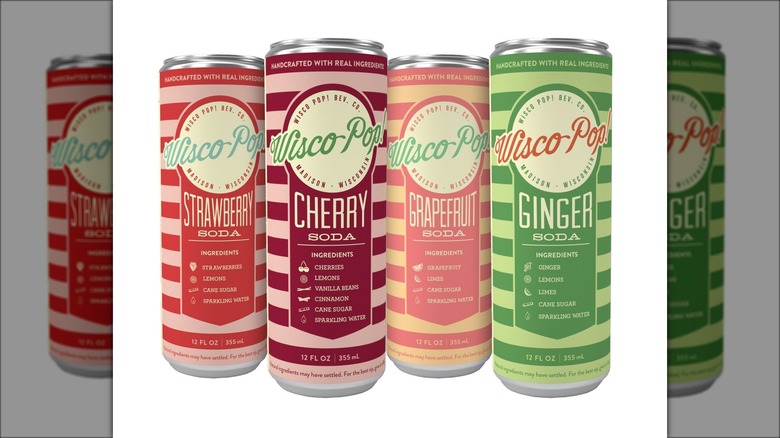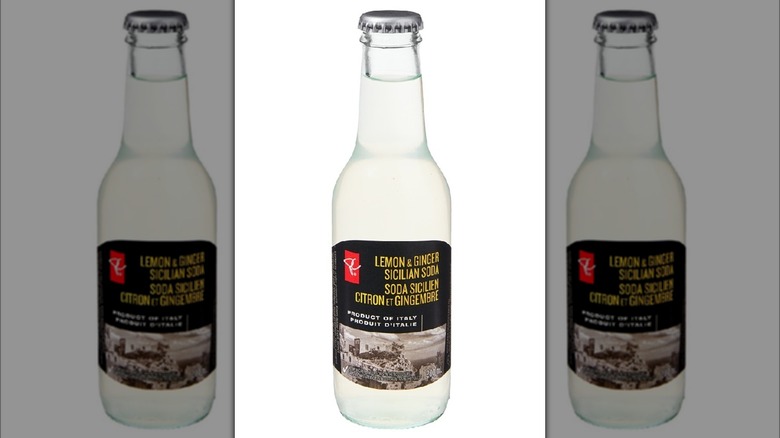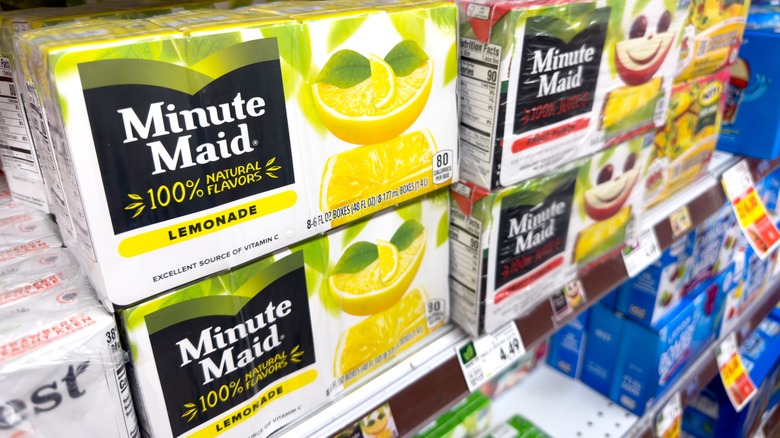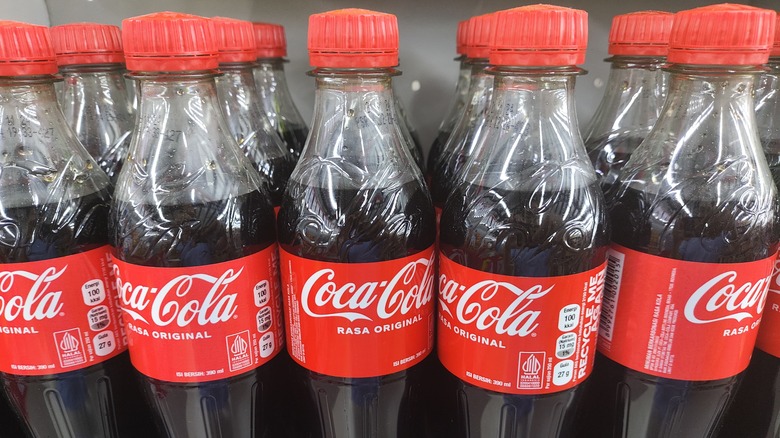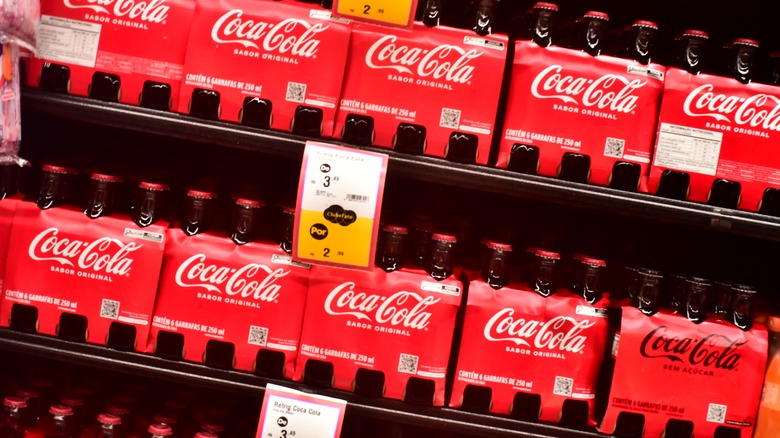The Biggest Soda Recalls In History
The perils of soda drinking extend beyond just the sugar content and presence of artificial colorings in the formula. Through the decades, soda recalls have proven that getting the contents of cans and bottles just right can be tricky and often expensive business. Protecting consumers and corporate reputations has been the cause of the biggest soda recalls in history, including one that required millions of cans carrying Coke's secret formula being pulled from shelves to ensure customer safety. It's an unfortunate turn of events whenever soda trouble bubbles over, but mass production of fizzy sips comes with a slew of sticky situations that can't be solved in any other way.
Though any recall can be an enormous undertaking for a soda manufacturer — not to mention the retailers and restaurants involved — some situations have required bigger soda recalls than others — both in quantity and potential severity for harm to consumers. Mislabeled ingredients, chemical and metal contamination, and foreign substances are just a few of the scenarios that have caused soda manufacturers to pull their products en masse from store shelves, soda fountains, and vending machines over the years. Here's a rundown of some major soda recalls that have left proprietors of U.S. carbonated beverages feeling flat.
Coca-Cola recalled 13,152 cases for sugar content in its non-sugar drinks
You can count zero sugar reformulations of familiar Coke-branded favorites as one of the company's qualified successes, a solution that allows refreshment for soft drink fans with blood sugar conditions. This makes Coca-Cola company's September 2024 recall involving more than 13,152 cases of Sugar Free Minute Maid Lemonade particularly troubling. How does a product that serves a sector with medical requirements as specific as sugar restrictions slip up so massively, endangering drinkers who've come to trust their sugar-free beverages to actually be sugar free?
The problem lay in the sugar-free labeling of the cartons, which actually contained the full-sugar Minute Maid formula. The recall ended up being labeled by the Food and Drug Administration as a Class II, which indicates a slight possibility of adverse health impact to the public. The cartons were shipped to stores in Kentucky, Ohio, and Indiana, and when the mistake was noticed, codes were issued to identify the offending items so they could be pulled from refrigerators in those states. It may not have been a soda recall per se, but it blew a bubble in the operations of the world's largest soda manufacturer nonetheless.
Pepsi recalled over 3,000 cases for non-sugar labeling mix-ups
Not long after Pepsi Co. encountered its own zero-sugar snafu affecting 200 cases of its Schweppe's Ginger Ale, the soda fun factory had an identical carbonated collapse involving its Mug Root Beer product line. In July 2024, 2,801 12-packs of the sudsy slurper had to be removed from retailers in a suite of Southern states, including Texas, Louisiana, and Oklahoma. It was a one-two punch that demonstrated how the canning process can go awry when you're fulfilling the thirst requirements of citizens around the U.S.
The discrepancy was discovered during a so-called internal investigation, which sounds like added precautions that may have been put in place after the ginger ale slip-up to make sure such errors are caught before they get out of hand. While the good news is that Pepsi Co. caught the bungle, the bad news is the company had close to 3,000 cases on shelves before realizing the mistake. So while sugar-free Mug might not be one of the Pepsi products that were massive fails, serving a sugar-loaded version in a sugarless can turned out to be a sizable headache to clean up.
Charles Boggini recalled its soda and beverage syrups for improper labeling
You may not recognize the name Charles Boggini as part of your soda-drinking experience, but syrups created by this producer end up in restaurant and concession counter soda fountains. Rather than occurring in cans and bottles, Charles Boggini syrup is distributed in one- and five-gallon jugs poured into machines and blended with carbonated water. So when a recall happens, not only is there physical product to be removed, there's also the issue of finding machines currently using the syrup so they can be cleaned — a soda nightmare for everyone involved.
Such was the case when a voluntary recall happened in June 2024 due to the inclusion of dyes and preservatives used in four syrups: Pink Lemonade, which contained Red No. 40, and Yellow Lemonade and Yellow Lemonade X, which contained Yellow No. 5, a known allergen for sensitive consumers. Cola syrup was also recalled due to its sulfite content, an additive that can cause respiratory issues when consumed in large quantities. The trouble wasn't with the chemical content in the syrups, but with the labeling, which failed to disclose these ingredients, a violation of FDA regulations. With distribution to eight states across the U.S., Charles Boggini had quite a bit of clean-up to do.
Coca-Cola recalled 2,000 cases for possible foreign material content
The last thing you want to find in your can of soda is literally anything other than soda. Thank goodness the Coca-Cola company jumped into high gear in December 2023 when unsavory substances were suspected to be in 2,000 cases of canned 12-packs of Diet Coke, Sprite, and Fanta products. Distributed to locations in Alabama, Florida, and Mississippi, the cases were not directly identified as being troublesome, but were pulled back regardless. This appeared to be one of those corporate-heavy tightrope-walking scenarios where words like "may contain" and "foreign material" are used to keep from causing a panic while cautiously admitting that something isn't exactly right with the soda in the cans.
You may be wondering, "What constitutes 'foreign material' in a soda recall such as this?" but it seems that the company never disclosed what the suspected contaminant was. Those who follow the soda recall circuit were left to scratch their heads and wonder. At least Coca-Cola took preventative measures before the situation got out of hand. Still, it would be nice to know what sorts of unexpected elements the soda drinkers of the world should be on the lookout for.
Wisco Pop recalled cans due to potential over-carbonation
Fizz lovers who adore a sharp crackle in their carbonated drinks may not realize the possibility exists that a soda can be over-carbonated. Boutique soda company Wisco Pop knows all too well the dangers of shoving too many bubbles into an aluminum can. This artisanal soda company was engaged in a voluntary FDA recall in May 2022 that required its signature four-flavor menu to be taken off shelves in Madison, Wisconsin, where the organic pop factory is located. The trigger for the recall? Warm soda cans were bursting, revealing the presence of wild yeast that led to fermentation and excessive carbonation in the cans.
Why would there be yeast of any kind in a soda can, let alone wild yeast? As a natural soda producer, Wisco Pop uses yeast-based scobie similar to what's used in kombucha to achieve a more wholesome bubbly beverage. Stray yeast in the cans began to ferment beyond the norm and gave the strawberry, ginger, grapefruit, and cherry specialty sodas an explosive personality that didn't sit well with food safety standards. For a mom-and-pop company like Wisco Pop, a recall of any size is a big deal.
Loblaws Grocery recalled its Lemon & Ginger Sicilian Soda for bits of glass in the bottles
You shouldn't have to specify that you were asking for a glass of soda, not glass in your soda. But shoppers at Loblaw Grocery needed to make the distinction in February 2022, when customers complained of finding bits of glass in its Lemon & Ginger Sicilian Soda as they made ready to consume their quaff. Whether drinking straight from the vessel or pouring it into a frosty mug, the transparency of glass could have made it imperceptible until it was too late, so Loblaws issued a notice letting customers know of the possible mishap and recalled its 200 milliliter bottles.
But it wasn't a wildly random occurrence that resulted in the possible shards floating around in the crackling carbonation. Lemon & Ginger Sicilian Soda is part of Loblaws' Black Label collection, a suite of specialty sodas packaged in old-fashioned glass to provide a premium soft drink experience. Logically, chipped bottles may have resulted in bits of glass making their way beneath the lid during the bottling process. Though there are no numbers detailing how much product was removed from shelves, avoiding accidental glass consumption makes this a pretty big soda recall to the customers who sidestepped potential injury.
Coca-Cola recalled 7,000 cases due to possible metal items caught inside cans
It's not far-fetched to think a soda cannery has all sorts of metal elements in motion as part of its operation. But when some of those metal pieces make their way into the product, consumability and customer confidence can go right out the window. Any metal involved in the production process should remain outside the soda itself, a lesson Coca-Cola learned the hard way in December 2021, when the company discovered some of its Minute Maid products may have contained bolts and washers — yes, bolts and washers — affecting upwards of 7,000 distributed cases. It wasn't a Build Your Own Robot promotion, simply a hazardous turn of events that caused a withdrawal of products shelved in Eastern Seaboard and New England states.
The month before, Coca-Cola had recalled cans of Coke and Sprite due to the possibility of foreign substances found within the cans, an event that ended up being tied to the nuts-and-bolts Minute Maid issue due to the proximity of both occurrences. Though there was no confirmation on the presence of metal pieces during either recall, the mere possibility launched the soda giant into action to prevent any downstream impact to consumers, since best-by dates on the affected items extended into February 2022. This is one instance where maybe you don't want to know what happens to your body when you drink a diet Coke, especially one that may have metal bits bobbing around under the lid.
Coca-Cola recalled 500,000 bottles in Japan for iron powder contamination
It's well-known that Coke takes on different tastes in different countries, but it's usually due to natural sugars or culturally-sensitive reformulations, not as the result of iron finding its way into the soda. But in May 2006, Japanese distributors discovered the presence of iron powder in six of the Coca-Cola company's products, including Coke, Fanta, and regional brands like Aquarius water. Though the recall was enacted, officials were quick to assuage public fears by declaring that there was no health risk, but companies as big as Coca-Cola aren't likely to take a chance, even if it means pulling 500,000 bottles off of store shelves.
How does iron powder end up in commercial beverages? Blame the frailty of metal in factory equipment, which allowed the substance to enter the most restricted areas of the operation: the drinking vessels. Drawing down half a million items is no small feat, but it's bound to have a better outcome than exposing consumers to unnecessary risks. There's no telling if the incident altered Coke's standing in the ranking of Japanese sodas, however, though its reputation for being proactive with its customers' safety remains intact.
Coca-Cola recalled 17 million cases of product across Europe due to the presence of benzene
Imagine popping the top of your soft drink and finding out it contains more than just syrup and bubbles; it also contains benzene, a sometimes-colorless or light-yellow fluid with a sweet flavor and a flammable personality. In June 1999, Coke enacted the largest recall in its history up to that point after benzene was discovered in soft drinks distributed in European countries. Over 200 consumers became ill after drinking the tainted beverages, leading to a pull-back of 17 million unit cases. Though that totals a huge quantity of 8-ounce cans, it didn't even represent 1% of the yearly worldwide volume for the company. But a recall this big is still a massive ordeal, especially with unwell consumers in the equation.
Financially, the company took a hit that was a challenge to recover from for the year, to the tune of around $60 million, resulting in negative sales for the quarter. The damage also tainted its reputation in the European market for a while, though a brand as resilient as Coca-Cola was able to rebound eventually. As soda recalls go, it's one of the biggest in history and represents the worst case scenario of what soda contamination can lead to, as well as how much effort goes into removing the offending items once they make their way into the market.
